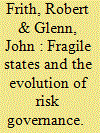| Srl | Item |
| 1 |
ID:
141891


|
|
|
|
|
| Summary/Abstract |
Following the plane crashes into the twin towers of the World Trade Centre, Ulrich Beck claimed that the West would need to pursue ‘border-transcending new beginnings’ towards a more cosmopolitan world. Rather than any radical transformation along cosmopolitan lines, however, this paper maps a process of incremental reform and policy bricolage, where the post-cold war politics of intervention, and the securitisation of development, have been extended to encompass international terrorism in three overlapping phases. Although these overlapping phases – intervention, prevention and extension – are reflexive moments, they constitute a strengthening of the prevailing rationalities and technologies of risk rather than a radical rupture.
|
|
|
|
|
|
|
|
|
|
|
|
|
|
|
|
| 2 |
ID:
088081


|
|
|
|
|
| Publication |
2009.
|
| Summary/Abstract |
Issues surrounding legitimacy and the role of civil society are at the forefront of contemporary global governance debates. Examining the United Nations Transitional Administration in East Timor (UNTAET) and focusing on the specific issue areas of justice and gender, this article evaluates the effectiveness and accountability of the administration from the perspective of East Timorese civil society, whose voice is largely absent from previous analyses. Drawing on the archive of the prominent civil society group La'o Hamutuk, this study adds precision and nuance to an area of research characterized by broad-stroke assessments of the legitimacy of multinational interventions. It finds variations in the levels of overall legitimacy exhibited by particular issue areas and differences in terms of the configuration of accountability and effectiveness enjoyed by UNTAET. Although sounding a cautionary note about the degree of civil society influence in global governance, the study concludes that La'o Hamutuk nevertheless provided a more diffuse sense of discursive voice and accountability than would otherwise have been accorded the East Timorese during this crucial period in their history.
|
|
|
|
|
|
|
|
|
|
|
|
|
|
|
|